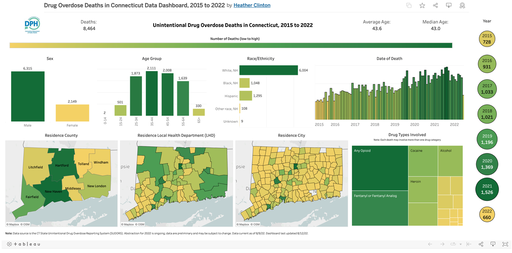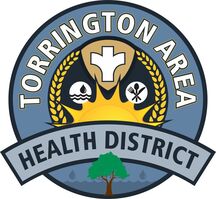In Connecticut, residents are more likely to die from unintentional drug overdose than a motor vehicle accident. The majority of these deaths are linked to overdose of prescription opioid painkillers and illicit opioids. According to the CDC, the 2016 Connecticut age-adjusted rate for drug-induced mortality is 25.1 per 100,000 population compared to the 2016 national rate of 17.1.
 Click to Access Dashboard
Click to Access Dashboard
The Connecticut Department of Public Health presents an interactive dashboard with drug overdose data to increase public awareness about the impact of the opioid crisis in Connecticut. In this dashboard, demographic, geographic, and type of drug-related overdose information can be visualized through the years from 2015 to 2021.
To navigate the dashboard, hover over maps and charts to get more details. To view the dashboard for selected years, time periods, demographics, or types of drugs involved, single click on these sections. Click again to go back to the original view or click the reset button on the bottom right of the screen.
The DPH uses syndromic surveillance system data from the EpiCenter system to provide near real-time estimates of emergency department (ED) utilization for suspected drug overdoses in order to quickly detect and respond to changes in patterns of both fatal and nonfatal opioid overdoses. To view the latest Connecticut data, click on the link. (Provide link to ED data).
To navigate the dashboard, hover over maps and charts to get more details. To view the dashboard for selected years, time periods, demographics, or types of drugs involved, single click on these sections. Click again to go back to the original view or click the reset button on the bottom right of the screen.
The DPH uses syndromic surveillance system data from the EpiCenter system to provide near real-time estimates of emergency department (ED) utilization for suspected drug overdoses in order to quickly detect and respond to changes in patterns of both fatal and nonfatal opioid overdoses. To view the latest Connecticut data, click on the link. (Provide link to ED data).



